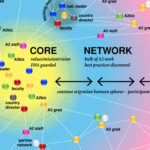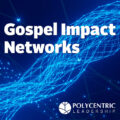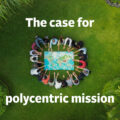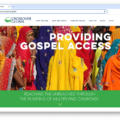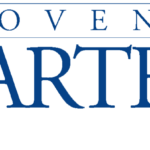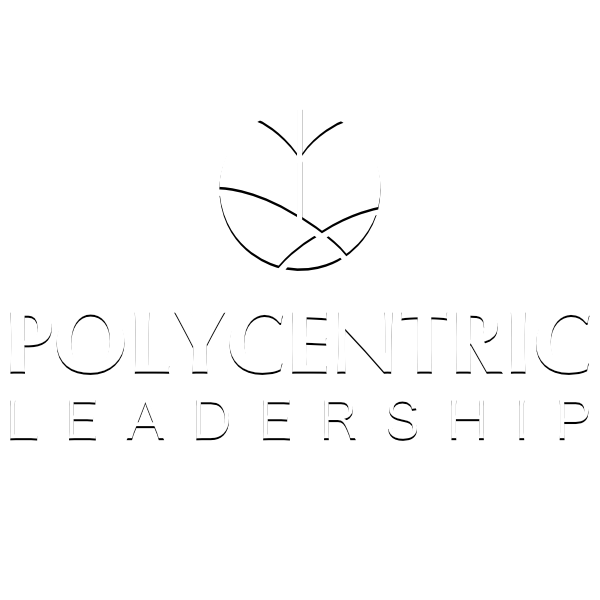Introducing Polycentric Leadership
The past thirteen months have been one of the most disruptive seasons in my lifetime. A global pandemic, one of the worst economies of the century, and a divisive political environment were all contributors. We have faced lock downs, loss of incomes and jobs, and the disease itself—as we still do at this time.
I began the year with high hopes and aspirations, only to find out that I would be stuck in one location for longer than any time of my life for the last 30 years. Trapped in my neighborhood in Tokyo, I didn’t catch a bus, train or even drive anywhere other than the local market for months on end. From March through August, I lived on Zoom and watched what appeared to be a planet spiraling into oblivion.
Moving back to Los Angeles in December 2020, it felt like the country I left five years ago was completely different. My home state, California, had stricter quarantine restrictions than Tokyo and yet many people didn’t abide by the regulations. In Japan, most people followed the guidelines, but our individualist society sees things quite differently. Our cowboy nature questions authority and wants autonomy to the nth degree.
All these conditions have created a chaotic atmosphere, making it difficult to thrive and challenging to lead.
Polycentric Leadership
How then do we lead during such seasons of intense disruption? Ironically, I had just completed a Ph.D. dissertation exploring a new theoretical approach to leadership that I call Polycentric Leadership.
Polycentric Leadership is collaborative, communal leadership empowering multiple centers of influence…Polycentric Leadership is collaborative, communal leadership empowering multiple centers of influence, and a diverse array of leaders to meet today’s challenges.
Polycentric Leadership is collaborative, communal leadership empowering multiple centers of influence…
The model stems from an idea I call Trinitarian Leadership – flowing from the way God leads through three persons of the Trinity. The interactions between Father, Son and Spirit provide a template for us to better serve our companies, employees, organizations and constituents. It also embodies the ideal expression of the Body of Christ: “For just as each of us has one body with many members, and these members do not all have the same function,so in Christ we, though many, form one body, and each member belongs to all the others.” (Rom. 12:4-5)
While it seems like every time I pull out my mobile or listen to a news podcast, I hear another heartbreaking story of how polarized the world has become, as we lean into one another and build off one another’s strengths and mitigate one another’s weaknesses, we become a stronger, more agile team—ready to tackle the challenges coming our way.
Leadership in Motion
So, how do we employ Polycentric Leadership within our organizations?
Polycentric Leadership involves six leadership traits that, when deployed together, empower us and our teams to thrive in the midst of and rise above polarization:
1. Charisma

In this context, charisma involves more spiritual depth, leading by the Lord’s direction, and the corresponding character qualities that flow from abiding in Christ.
2. Collaborative

A collaborative leader works with her colleagues as a team, in a shared and participatory manner. Everyone works as equal partners, pulling out the best in one another, seeking to accomplish the organizations’ goals and objectives.
A collaborative leader works with her colleagues as a team, in a shared and participatory manner.
visionSynergy, whose CEO Kärin Primuth, who is co-teaching with me and others in a June 2021 Outcomes Conference Leadership Intensive “The Effective Future: Polycentric Leadership,” shares how the vitality of collaboration can extend beyond one company or organization. When organizations work together to achieve a common vision, they enhance the capacity to realize their shared purpose. In visionSynergy’s case, inter-organizational and multi-church groups serve together to reach entire regions for Christ (especially among places where the gospel has had the least impact)
3. Communal

One of the strongest components of Polycentric Leadership that I have observed over the past five years in Japan is the communal nature of Japanese leadership. We become stronger as a team because we, like the Trinity or the body of Christ, exhibit a leadership that fosters a rich sense of community. In Asia, I’ve seen the collective prove more resilient during times of crisis than the individualistic model.
Michael Oh, CEO of the Lausanne Movement, another co-presenter for our Outcomes Conference Leadership Intensive, is embarking on a communal process for the fourth Lausanne Congress on World Evangelization. Rather than relying on one huge event in 2024, Lausanne is running multiple listening groups across the world to hear what is happening on the ground, in every region and from every perspective and vantage point. In these communal listening gatherings, momentum is being built for a powerful collective moment in 2024 to catalyze, in polycentric fashion, the shape and direction of the future in Global Mission today
4. Relational

Recently, a friend asked me, “How do you gain so much favor with the leaders that you know? They clearly trust you.” I benefitted from the help of a Japanese colleague who took me to visit many of these same friends. He displayed the importance of building relational capital. Trust is so important in our polarized world; the best way to build trust is to spend time with your co-workers and clients, getting to know them and if possible, their families. The deeper you go in relationship, the stronger your leadership will be.
During COVID-19, our (Asian Access) movement has met monthly for prayer and sharing via Zoom. And, between times we have a WhatsApp and Facebook group to share with one another. Several times our team will connect one-on-one via video, calls and messaging. All of these help keep our relational connections strong.
5. Entrepreneurial

This was one of the surprising findings in my research – the importance of freedom to lead within a polycentric system. In order to thrive, each person on the team must have the autonomy to make decisions based upon their wisdom and knowledge of the situation. In 2020, it was the creative, entrepreneurial leaders who thrived amid the chaos.
6. Diverse

Finally, tapping the full range of expressions embedded within your world enhances the capacity to achieve. The wisdom found in the entire Body of Christ – women, men, representing a variety of regions, ethnicities and cultures serves as a type of super glue, holding the organization and mission together as all voices are respected, heard and utilized. As others see such unity in diversity, it attracts them to what we are trying to accomplish together.
Promod Haque, Senior Managing Partner with Norwest Venture Partners, and also a contributor to our Outcomes Conference Leadership Intensive, is lauded for leveraging this within his firm. As Haque states, “In venture capital, it’s important to have syndicate partners who are like-minded and also bring multiple perspectives and contacts to the group.”
Thriving in Leadership
Polycentric Leadership will help us to model Jesus’ prayer that we: “may be one.”
As our world becomes increasingly complex and societies become increasingly polarized, our primary imperative is for us to come together:
“My prayer is not for them alone. I pray also for those who will believe in me through their message, that all of them may be one, Father, just as you are in me and I am in you. May they also be in us so that the world may believe that you have sent me. I have given them the glory that you gave me, that they may be one as we are one— I in them and you in me—so that they may be brought to complete unity. Then the world will know that you sent me and have loved them even as you have loved me.” (John 17:20-23)
Polycentric Leadership will help us to model Jesus’ prayer that we: “may be one.“ Just as the Father, Spirit and Son lead together in unity, so too we can aspire to serve like our Trinitarian Lord. As we lean into these six Polycentric Leadership components, drawing from the full spectrum of our organizational communities, we will better embody this spirit–so that the world may know Jesus as Lord and Savior!
About the Author
Rev. Joseph W. Handley, Jr., Ph.D. (@jwhandley) is the president of Asian Access. Previously, he was the founding director of Azusa Pacific University’s Office of World Mission and lead mission pastor at Rolling Hills Covenant Church. He co-led one of the first multi-national high school mission congresses in Mexico City in 1996 and is a contributing blogger for the Billy Graham Center’s Gospel-Life Blog. Joe serves on the International Orality Network leadership team and on the advisory teams for the Nozomi Project, BiblicalTraining.org, and DualReach as well as the board for ReIgnite Hope. Joe strives to develop leaders for mission movements.
This article has been reposted with permission from CLA. Originally published here: https://outcomesmagazine.com/polycentric-leadership/ in Spring 2021 edition of Outcomes magazine, Christian Leadership Alliance
More Information
- Header photo courtesy Outcomes magazine, Christian Leadership Alliance.
- Dr. Joseph W. Handley, Jr. will co-lead a full-day leadership intensive “The Effective Future: Polycentric Leadership” at The Outcomes Conference 2021, June 15-17 in Orlando. Register to attend!


